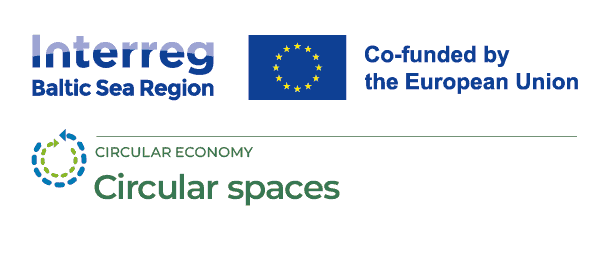
Circular Creativity: International Teams Innovating Sustainable Solutions in Makerspaces
06 September 2024
International teams in makerspace DARE, Valmiera, Latvia
- Team proposal is to create a product made of dog fur (sweater), also using different equipment in DARE makerspace to create sustainable packaging for the product and custom hanger that is needed for this type of product. The team consists of:
- Laine Uzulena, designer, environmental artist, teacher;
- Diana Svitka, Technology expert in DARE makerspace;
- Asger Nørregård Rasmussen, Community and Lab manager at Maker makerspace (Denmark).
- Team proposal is to create a product using plastic waste from 3D printing that is accumulated in the makerspace (PLA plastic filament leftovers, plastic spools). In order to achieve that they will create mould for product using equipment in the makerspace (3d printer, CNC and laser cutter). The team consists of:
- Karina Vitina, designer, maker;
- Liva Birkava, designer;
- Maris Ozols, DARE makerspace manager;
- Asger Nørregård Rasmussen, Community and Lab manager at Maker makerspace (Denmark).
International teams in makerspace RADE, Ventspils, Latvia
The team consists of three people – Elīna and Baiba who live in Ventspils, Latvia, and Jan who lives in Stavanger, Norway. They are all more than willing to jump into the project “Circular makerspaces” to put unneeded materials to use and create something beautiful. They have two ideas in mind. The first one is creating light boxes from plastic leftovers. The box would have various cut-out ornaments and lights of different colours. The second idea is to create design pins for clothes from acrylic plastic leftovers. The material leftovers will be supplied by a local business
International teams in makerspace Maker, Copenhagen, Denmark
Studio CircOlar is a material-driven design studio. We aim for critically embracing the as-found condition, repurposing materials, and inspiring collective engagement. Currently we are working with grass and paper waste. We source paper waste from museums in Copenhagen, mainly from Kongernes Samling. As for the grass, we have been in contact with the municipality of Køge and Dansk Golf Union as the resource of grass clippings from roadsides and green space.
The idea of combining grass and paper waste as fiber-based composite material comes from the concerns we see in the current centralized recycling industry, both that of grass and of paper, as well as the potentials of those two materials complementing each other. We aim to revolutionize our perception of paper and grass, from a mundane and ephemeral resource that can only be downcycled, to a strengthened bio-based material to be creative with. We wish to expose the hidden industrial processes to the public through the so-called imperfections in our creations, the imperfections that challenge if a piece of paper needs to be bleached, be flattened or even be made into a sheet, in order to serve as a communicational means.
Studio CircOlar has been teamed up with their local mentor, Asger Nørregård Rasmussen from Maker, as well as Nauris Boguts and his team from Ventspils High Technology Park in Latvia.
Link to the website: https://studiocircolar.com/
International teams in makerspace Gewerbehof, Luckenwalde, Germany
Pedro Moraes (1990, São Paulo, Brazil) is a Berlin-based visual artist whose work spans various media, exploring contrasts and consumption. His background in Industrial Design and Fine Arts, coupled with his experience of immigration, deeply influenced his art. The Circular Project by Moraes combines industrial objects with 3D-printed pieces to create sculptures, focusing on upcycling and reclaiming old tech pieces. The project questions resource use and planned obsolescence, encouraging audiences to reflect on their consumption habits and sustainability.
Mathias Gramoso was born in 1990 in Paris, France. Lives and works in between Berlin, Germany, and Porto, Portugal. His work explores the profound interplay between the natural elements and human emotion through technology. For this project research, he will explore different types of materialities, as on his previous work he has been engraving on old television screens and to further research this process creating new types of sculpture in connection with language, sound, and geometry.
João José Santos (1988 Porto, Portugal) is an architect and designer focusing on creative and functional design. His current project explores economic circularity by creating versatile objects, such as a shelf and a step, using reclaimed materials and innovative brackets. By emphasizing durability and adaptability, João aims to reduce waste and inspire sustainable practices. He values maker spaces for their role in enabling individuals, challenging traditional consumption habits, and fostering engagement with eco-friendly living.
Santiago Burelli, (1993, Caracas, Venezuela) is an artist working across various mediums. His projects explore recycled materials, space, and sound. In “Lumino-Sonoro Circularity,” he 3D prints an omnidirectional sound system. This project examines the extractivist production cycle experientially.
International teams in makerspace Creator, Stavanger, Norway
Giorgio Pattarini is an applied physicist, working on material science and technology development.
With the company Pattarini Practical Technologies, based in Stavanger, Norway leverages years of expertise in the so called “Soft Matter”, which means particle suspensions in liquids, emulsions and structural composites. Customers were Fossil iFuel industry in the past and
Related to the Circular Makerspaces project, the company has worked in partnership with Spectrum Blue company founded by the disruptive manager Brage Johansen, to produce filamen and resin for 3D printing, incorporating a new granular material with antibacterial and photocatalytic function.
Related to the observation and characterization of composite materials, Pattarini is also founder of the startup Abyssar Optics, specialized in the design and manufacture of special microscope and camera objectives. for imaging inside high RI mediums.





